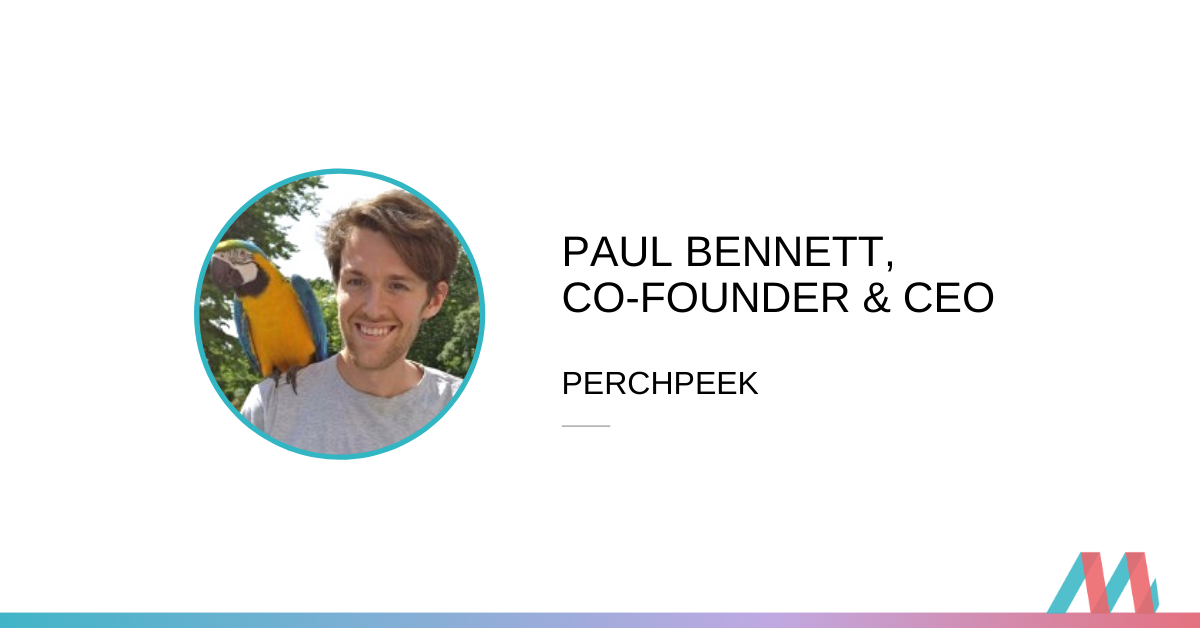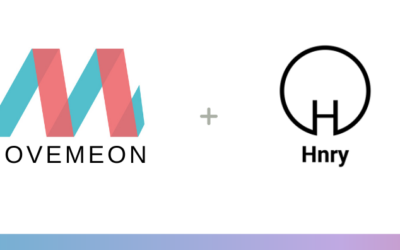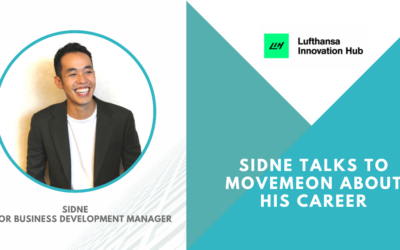Disrupting the ever stressful renting process, Paul talks to Lara about his career from dipping his toes into investment banking, Amazon and eventually starting Perchpeek, an app helping employee relocation become quicker, cheaper and happier.
—
Please could you take us through the start of your career?
I studied PPE (Philosophy, Politics and Economics) at Oxford and when I arrived, people had already done a few bits of work experience. I felt like, ‘wow, people are really on it here – I need to sort my career out’. The main work experience seemed to be in investment banks, the biggest active mis-selling you’ll ever see! They basically wine and dine you and pretend that it’s not too bad. Off the back of that, they interview you and you get a summer internship. So I was at Credit Suisse for one summer in the Investment Banking team, which if you ask anyone who knows me, was a dark time in my life (laughs). A lot of crazy hours! But you definitely learn a lot – I still got a few Excel shortcuts in the back pocket from that.
Also, I realised I didn’t want to work for a company that was doing stuff for other companies, like professional services – you’re so disconnected from what the company’s actually doing. So that was actually really useful because it basically wrote off this massive group of companies.
After university, I went traveling with my Credit Suisse earnings – a big positive from investment banking – when a recruiter called about roles at Amazon. So I worked at Amazon for about three years. But I always had this itch in my mind about Perchpeek, so after Amazon, it felt like the best time to start it.
Where did that itch to start Perchpeek come from?
When I was travelling with my partner, a lot of our friends were moving to London and having quite a painful experience. Have you relocated yourself at some point?
Yeah, when we first met, I was moving house and I’ve moved house since. So yeah I’m familiar with how painful it can be!
I think it’s quite a common issue which is why there’s lots of startups in the space. We moved to London and it was just so fragmented! So we started doing a few bits and pieces in the space, trying to find a better way. A few big pivots later, this is where Perchpeek is now.
Did you come from the angle of ‘this is a really good idea – we should start a company to solve this’?
No, it was analytical in terms of ‘I’d like to start a company’. When I was looking for jobs, I realised I might as well start a company on the side if there’s no overheads of doing it.
I wrote down three different idea, but the renting idea felt like the biggest problem and most tech involved.
I had always been loosely interested in entrepreneurship. Plus, I could just spend loads of time learning about basic website development and ‘get out the room’ as they say in startup land.
After Amazon, you were part of a prop tech cohort / incubator. How did that work out and what effect do you think that had on you being able to launch a business?
Really useful! In 2017, when I was still at Amazon, we had a few customers with a very rudimentary product. So we tried fundraising and found PI accelerator. The most useful aspect was meeting other companies who were equally clueless as us and figuring it out together. When you’re in the startup ecosystem for a while, it becomes quite easy to meet people and network, but when you’re not inside, you don’t know anyone.
We were also lucky because it just de-risked the whole experience for us. People always said to me I can’t believe you left Amazon to start a company. It was part of a £200k fundraise where we knew we could at least have a year of doing stuff. Plus, they had some really great experts who helped with things like legal and GDPR and accounting and just all of the stuff that you don’t think about, but, ends up catching up to you now the line.
Now that you’ve had Perchpeek for a few years, what would you say have been your main pain points of being a founder?
Good question. Firstly, choosing what to learn yourself vs what to find others to help with. Most founders want to do lots themselves, but it’s not the best idea to spend months learning to code or learning digital marketing or whatever it might be. At Amazon and other corporates, time is somewhat directed for you. Whereas as a founder, what am I going to do to today?
Secondly –fundraising is stressful and hard. You develop a very thick skin after hearing ‘no’ a lot. Plus, you’re not necessarily improving the business – even if it’s good to get smart people giving their insights into the company.
Are you fundraising at the moment?
No, we’re not – which is probably why I’m in such a good mood! We just finished one round at the end of last year so now we are going into execution mode. I’m really enjoying getting stuck in again, plus our team is growing quite a lot. That’s something else on my mind – how do we make sure that everyone is pulling in the same direction?
How many people are on the team now?
There’s 32 of us now. Since I first met you, we pivoted our business. We now take on a lot of the operational complexity of relocating. We organise all your viewings for you, your shipping quotes, short-term accommodation, long-term accommodation, council tax, banking – anything to do with your relocation. It’s a lot more hands-on which means we need a lot more people.
I remember when we were speaking last, you were looking to build out your B2B offering because it was currently a B2C company. How did that progress?
Originally, we connected you to a great home but you would liaise with the agent / landlord. But we learned that actually people didn’t like that, along with all the other pain points in the relocation process. So, we built out that side of the product so we could support all of this.
But we had two main issues – firstly, we weren’t making very much money, which isn’t great for a business running out of money! And secondly, it’s really hard to locate people who are looking to move.
So we realised companies know when employees are about to move and it’s a great benefit to support people that are relocating. So that’s been a great pivot for us!
Has your focus always been on international moving, as opposed to within London?
Initially it was within London but then we realised our sweet spot was people moving to London or outside of London. Now it’s mainly internationally, although about 50% of our moves are US because the US is so big that state-to-state relocation has a lot of the similarities with international cross border moves.
Have you fully launched in the US now?
Yes – we’re active in 47 countries now, which sounds very grandiose! But in reality, it’s a good way to launch internationally without loads and loads of overheads. Even if we’re only moving a few people to each of those countries.
So you’re actually physically moving people?
We’re actually moving people. For somewhere like Japan, we need stuff in the app! Initially we have freelancers so we don’t have to hire people in every country especially where we don’t have very high volume. But it helps us grow horizontally and build out an international company, which is in keeping with our new mission of helping people move around the world!
How do you balance having an international company with establishing and encouraging a healthy company culture?
We used to think a good culture was everyone sitting in one room going for drinks, team lunches on a Friday, events etc. It felt a lot easier, right? You see people all the time! Now we’ve realised you have to put in more intentional effort to build a culture. We are doubling down on written communication so that people in different time zones aren’t left out. Plus we focus on mental health and provide access to resources.
Also post pandemic (if you dare to dream), we won’t return to full time in the office. Instead of having someone trek in for an hour just to sit there with headphones on and reply to emails and then commute an hour back, we want to focus on good quality company and retreat. We’re excited about building a new culture in this new space!.
How did you realize that culture needed to be more intentionally put together?
I think it was a feeling and then we asked everyone and then it was like… okay, we need to do something different! We had a big issue in terms of communication around company goals and objectives. It’s quite easy when you see each other every day, but suddenly you don’t see anyone! Someone in Sales might not speak to someone in Operations. So the more we asked, the more we saw this is definitely a big issue! So we’re just trying to improve our communication and understand what benefits work in a remote world and then post pandemic, what does this hybrid work model look like?
We’re seeing more companies come to us with advice around culture in terms of diversity and inclusion. How do you approach that within your company?
This was a really big issue when we focused on hiring people in London, whereas now we hire from all over the world. We just naturally have a more diverse pool of applicants because we’re open to hiring people from any geography. It was quite a learning curve for us because it really showed which unconscious biases we did have. Instead of looking at someone’s CV, judging companies, judging education, you don’t have any of those in-built prejudices!
Also, I think what is typically defined as a good culture (in-person, beers on a Friday, team-building aspect) doesn’t actually work for everyone.
Yeah, it’s definitely exclusive – it doesn’t work for people with kids, people who don’t drink.
Exactly! I think underlying the conversation around returning to the office is that people are worried about losing that culture. But that culture doesn’t work for everyone. And baked into that model is the notion that people who succeed are these social butterflies who are good at – what’s that phrase? – greasing palms or rubbing elbows (laughs).
We definitely wouldn’t say that we have solved it but we’re finding that by being open to recruiting internationally, we are becoming more diverse.
That’s great! One final question – if you had to give one piece of founder advice, what would it be?
The main one for me would be don’t be afraid to pivot and be honest when stuff isn’t going well.
Once you go out, raise some money and get committed, it’s quite hard to actually step back and say ‘what have we learned here? Are we going down the right path?’ I think we could have grown or been successful a lot faster if we’d been honest. I think being willing to fail quickly and pivot helped us grow faster.
That’s great advice! Thanks so much for your time Paul and speak soon!
Movemeon supports organisations to hire all over the world

Click here for more insight into other organisations hiring on Movemeon.com



